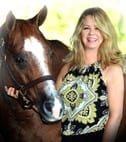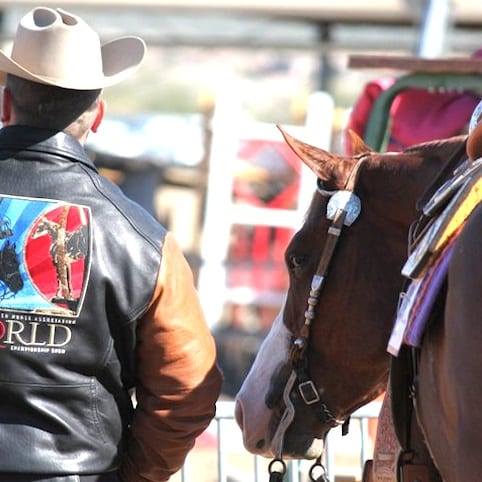In 2011, AQHA initiated a new program enabling Amateur and Youth exhibitors to lease a horse to show in AQHA events. Three years into the program, we wanted to find out what people think now.
Before this new rule, competitors were only allowed to exhibit a family owned mount. In the attempt to keep the playing field level, AQHA implemented rules including that all fees, veterinarian, farrier work, etc. is paid by the lessee during the time of the lease. To prevent horses from going from person to person, there is a minimum of one year. The maximum allowed time to have a horse in the lease is three years. Competitors must download the form, which must be filled out and signed
by both the lessee and lessor. The current fee to process the lease is
thirty dollars. After the three year period, if the lease is to continue, the form does need to be filled out and sent to AQHA again to renew the terms of the lease.
In December, 2010, GoHorseShow interviewed several people prior to the rule taking effect in 2011. Their opinions were varied. Some were very much in favor of the program, stating that it would bring an influx of new riders. Others, however, were less than pleased with the program. They stated that it might hurt the breeders and sellers and create an unfair advantage to those who are able to lease a World Champion.
Tom Persechino (pictured below left), the Executive Director of Breed Integrity and Competition at AQHA, gave us some insight into how the program has progressed. He states that the numbers are increasing steadily. In the year after the program was initiated, there were 312 leases filed. The next year it had increased to 422. This year there have been 511 to date. Persechino stated, “It appears members are utilizing the lease option in increasing fashion.”
 While most are happy with the program, not everyone is. The most common complaint is that leasing a top horse does not create a level playing field. Debbi Trubee, who stands Lazy Loper, and Invitation Only at Pine View Farm in Ohio says, “I don’t know that the program hurts, but I am not sure it helps either.” She says that when somebody could lease a horse, why go buy one? “It certainly does not encourage novice riders who can’t afford to lease a World Champion.”
While most are happy with the program, not everyone is. The most common complaint is that leasing a top horse does not create a level playing field. Debbi Trubee, who stands Lazy Loper, and Invitation Only at Pine View Farm in Ohio says, “I don’t know that the program hurts, but I am not sure it helps either.” She says that when somebody could lease a horse, why go buy one? “It certainly does not encourage novice riders who can’t afford to lease a World Champion.”
Jenny Sims, a mother of three kids just starting their show career, has a different take. She questions what children are learning by getting a world champion horse. “They are not working for it, it’s just being handed to them!”
Clarice Cooper of Cooper Quarter Horses agrees. “It is hurting the industry, I have seen kids who have never shown get put on a horse and go and win the Congress. How is that helping get new people into the Association?” Cooper is adamant that the program is only a benefit to the select few. “I see trainer’s kids riding and showing horses that are owned by their parents’ clients. I feel the program is basically turning people off.”
Persechino told GoHorseShow, “We welcome – encourage members – who have input and recommendations on this rule – or any others to submit those for consideration. With more than two years of data, if members have questions on length of leases, types of horses and/or exhibitors using the program, we are more than happy to provide that if it will help create what people see is a better rule.”
 Amy Gumz of Gumz Farm has a different take on the program. “I think it’s a positive step for AQHA. I see it as an avenue to reach people who may not be considered a target market.” She goes on to state, “I don’t think it has affected my business in a negative way. I see it as a positive for me in the example as broodmare prospects…if I have a filly that I would like to keep and eventually return to the broodmare herd – if the right connection is made- I can lease her for her show career then get her back for breeding use. I see this as a win-win.”
Amy Gumz of Gumz Farm has a different take on the program. “I think it’s a positive step for AQHA. I see it as an avenue to reach people who may not be considered a target market.” She goes on to state, “I don’t think it has affected my business in a negative way. I see it as a positive for me in the example as broodmare prospects…if I have a filly that I would like to keep and eventually return to the broodmare herd – if the right connection is made- I can lease her for her show career then get her back for breeding use. I see this as a win-win.”
Halter breeder Lea Ann Koch of Illinois was originally interviewed in 2011 when the program was first developed. Although she was initially unsure of the program, thinking it may be harmful to sales, she has since changed her mind. “Another way to look at it is with the way the horse market is if you can’t sell it, at least lease it. Because it’s off your bill and is still out in the public eye, which might get it sold. Plus, if someone can’t afford to buy one they could lease it. So, I guess it’s turning out to be a good deal.”
Ruth Ellen, who owns and operates Horse Source, Inc, an equines sales company, said the leasing option has not affected her sales because it is still such a minority. “I haven’t encountered any problems with the program whatsoever.”
Jessica Torpey of Torpey Performance Horses has this to say, “If AQHA could convince its alliance partners to do the same, I’m betting it would go over well especially in the lower levels.” Torpey shows both AQHA and NRHA and says she would love to be able to be able to lease a horse to show in both Associations. She did go on to say,”To keep things on a level field, horses in their Futurity or Derby years should not be able to be leased.”
 Since it is still such a small group of people leasing, the program has not appeared to adversely affect any owners or breeders. Trainer, Brent Tincher of Ohio, says he would certainly use the program. He believes it might allow people who cannot afford a well-trained horse to be able to compete competitively. He does state that he has not utilized the program as of yet.
Since it is still such a small group of people leasing, the program has not appeared to adversely affect any owners or breeders. Trainer, Brent Tincher of Ohio, says he would certainly use the program. He believes it might allow people who cannot afford a well-trained horse to be able to compete competitively. He does state that he has not utilized the program as of yet.
The program does appear to be gaining momentum. Since it still has relatively small numbers, its impact has not been noticed. Most people appear to approve of the program, as long as it does not result in a discrepancy in the playing field. When AQHA implemented the program, they did put a minimum of one year to keep people from leasing horses just for the “big” shows. AQHA appears to be satisfied with the program and stated there were no new rules that were discussed or passed at the convention.
AQHA’s Tom Persechino did stress that the form needs to be filled out and in the AQHA offices prior to showing. An exhibitor could risk disqualification if the form has not been received and processed.
As the program continues to grow, it could become a wonderful tool for Amateur, Youth and Novice competitors. Time will tell.
About the Author: Donna Jahnke has been in the horse industry for four decades. With her husband Kent, they run 4J Performance Horses in Danville, Indiana where they stand their two AQHA stallions, Smart Sailing Dun It and Day Work For Cash.









